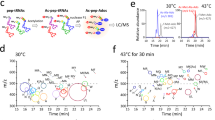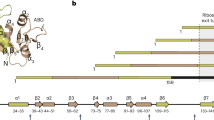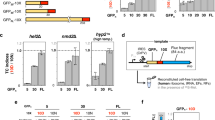Abstract
PEPTIDYL-tRNA HYDROLASE (called hydrolase below) catalyses the hydrolysis of peptides from peptidyl-tRNAs that are not bound to ribosomes1,2 but will not hydrolyse amino acyl-tRNA or fMet-tRNAfMet. It is interesting that hydrolase seems to be ubiquitous in nature, it has been found in all cells where it has been sought, including yeast3, bacteria, rat liver and jackbeans4 However, the metabolic role of this enzyme has not been established It is required for normal function, as a mutant strain of Escherichia coli with a temperature-sensitive hydrolase cannot continue protein synthesis at the nonpermissive temperature5 Hydrolase itself is not required for initiation, elongation or termination phases of protein synthesis6 Menninger7 has shown that peptidyl-tRNA, formed on ribosomes, accumulates at nonpermissive temperatures in cells with the temperature-sensitive hydrolase. Hydrolase thus seems to be a scavenger enzyme of peptidyl-tRNAs normally aborted from ribosomes during protein synthesis Of interest now is why peptidyl-tRNA is frequently prematurely released from ribosomes and why protein synthesis is inhibited in the mutant strain with a defective hydrolase5 I report here work on the latter problem and present evidence which indicates that peptidyl-tRNAs accumulate and compete with N-formal-Met tRNAfMet during initiation of protein synthesis.
This is a preview of subscription content, access via your institution
Access options
Subscribe to this journal
Receive 51 print issues and online access
$199.00 per year
only $3.90 per issue
Buy this article
- Purchase on SpringerLink
- Instant access to the full article PDF.
USD 39.95
Prices may be subject to local taxes which are calculated during checkout
Similar content being viewed by others
References
Lapidot, Y. & deGroot, N. Prog. Nucleic Acid Res. molec Biol. 12, 189–228 (1972).
Menninger, J. R. & Mulholland, M. C. & Stirewalt, W. C. Biochim. biophys. Acta 217, 496–511 (1970).
Jossel, H. & RayBhandary, U. L. J. molec. Biol. 35, 539–560 (1968).
Menninger, J. R., Deery, S., Draper, D. & Walker, C. Biochim. biophys. Acta 335, 185–195 (1974).
Atherly, A. G. & Menninger, J. R. Nature new Biol. 240, 245–246 (1972).
Menninger, J. R., Walker, C., Tan, P. F. & Atherly, A. G. Molec. gen. Genet. 121, 307–324 (1973).
Menninger, J. R. J. biol. Chem. 251, 3392–3398 (1976).
Galas, D. J. & Branscromb, E. W. Nature 262, 617–619 (1976).
Zengel, J. M., Young, R., Dennis, P. & Nomura, M. J. Bact. 129, 1320–1329 (1977).
Fowler, A. V. & Zabin, I. Proc. natn. Acad. Sci. U.S.A. 74, 1507–1510 (1977).
Kennell, D. & Riezman, H. J. molec. Biol. 114, 1–21 (1977).
Author information
Authors and Affiliations
Rights and permissions
About this article
Cite this article
ATHERLY, A. Peptidyl-transfer RNA hydrolase prevents inhibition of protein synthesis initiation. Nature 275, 769 (1978). https://doi.org/10.1038/275769a0
Received:
Accepted:
Issue date:
DOI: https://doi.org/10.1038/275769a0
This article is cited by
-
Natural premature protein synthesis termination can be reduced in Escherichia coli by decreased translation rates
Molecular and General Genetics MGG (1979)



